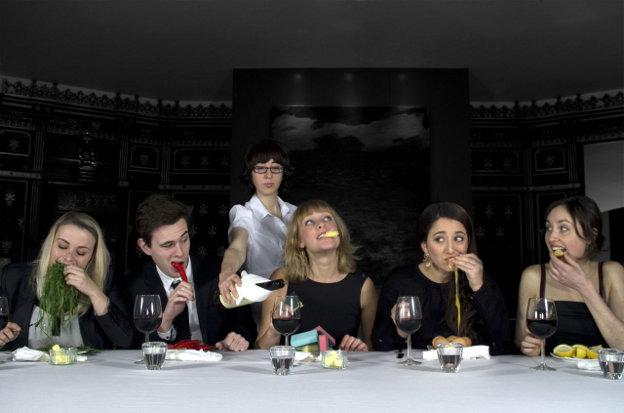Table Manners dished up three courses ‘exploring the rituals of food and dining that enshrine our social hierarchies and hang-ups’.
First comes the buffet, Delia – We’ve Been Thinking, presented in lavish colour by Hunt & Darton. Seating is placed around the fully laden and largely inaccessible buffet display. We are given name tags so that the hosts (performing as Jenny and Holly) can call on us for comments, assign us tasks, and comment on our appearance or life history. It is a playful riff on the hosting of parties, interaction between strangers and the role of the guest – should we really crawl under the table to get at the Twiglets? Participants are asked to read out conversations, or recipes, or shout for more Babysham. There is a wine and cheese tasting event and forced laughing and some slightly inappropriate dancing on the tables, delivered with deadpan and strict authority.
Such a format depends on the engagement of the audience, and my group was a fairly reluctant bunch, less eager to respond and join in than Hunt & Darton’s regular followers. What should have been an ‘amuse-bouche’ felt like a bit an ordeal for the performers and for the audience – whether they wanted less of it, or more.
The second course, Future Ruins’ Exterminating Angel, is similarly hostage to particular circumstances, but this time because the majority of the content is improvised. The audience is now totally passive. We are viewers of a dinner party without end (inspired by the Buñuel film of the title) as five friends chat, play, fight and test each other over a meal where nothing is eaten and nothing is drunk. It ebbs and flows, as conversation so often does, at times banal and then searingly personal. There are interruptions that are probably prompts to move the story along – a very loud scream for example. A key episode deals with confessions, each in turn detailing something they have done of which they are ashamed. It was painful to witness. Director/deviser Jack McNamara has shaped the piece well. The cast is extremely accomplished and naturalistic but I didn’t fully believe their relationship as friends, nor did I particularly like any of the characters, which reduced the emotional pull. Despite being the most fully formed and theatrically testing of the trio, it felt like a long hour and never quite reached full boiling point. Another time it might be startling and unforgettable; it certainly has that potential. But that is the issue with improvisation. It so often appears more challenging, rewarding or enjoyable for the practitioners than the audience.
Finally comes a fine dining experience, Glasshouse, courtesy of The Honest Crowd. Another large table, around which the thirty or so of us sit, behind a glass of red wine and a slice of French stick on a plate. Five performers are sat amongst us, and a deadpan waitress serves them each in turn. A conversation starts and crosses the table. It is a fun one; they are chummy and convivial. Gradually the control slips, sentences get mangled, the food gets absurd. They are fed grass, and chillies, washing-up sponges and raw eggs and more wine which overspills. Throughout it they maintain a semblance of balance, even when blindfolded and sprayed with water. A blackout and flashing lights provides cover for the letting rip of polystyrene balls. Glasshouse is a fun metaphor on the way friends can behave when the wine grabs hold and people no longer notice what they are eating or talking about. The young cast is rehearsed to perfection in a slick and engaging piece, and if at first the audience was kept at arms length, it soon became part of the action. Glasshouse was not deep or life-changing theatre, but it was a charming, messy pudding of a show with which to end Table Manners.
Produced by The Basement for Brighton Festival, the event was well linked in terms of content and the audience was led through the three spaces of a dining experience with care and attention. Whilst the companies were self-contained, with their own technical teams, the production values throughout were high, with crisp tablecloths, sparkling glasses and fresh ingredients. No easy task for three two-hour performances each day. Less successful perhaps was the adjustment the audience had to make moving from participation, to passive voyeur, to communal experience. The rhythm of it didn’t quite work for me, but maybe I am a greedy consumer… I did crawl under the table to get at the Twiglets after all.

